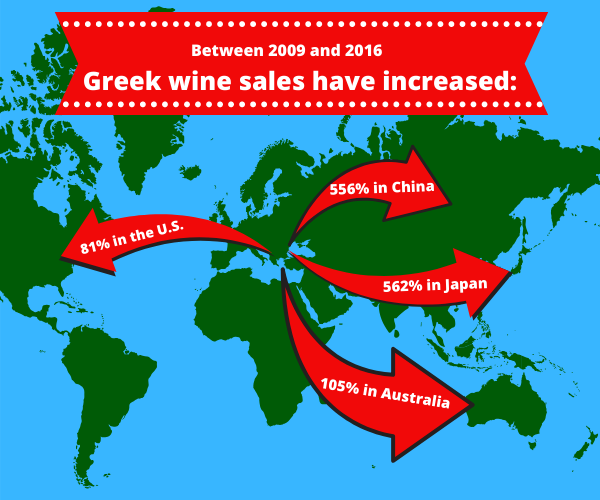Tourism in the Greek isles has been on the rise, as has drinking Greek wine.
Between 2009 to 2016, Greek wines sales have increased by 81% in the United States. While this is huge growth, Greek wine sales increased by 562% in Japan, 556% in China, and 105% in Australia, a country that has its own reputation in fine winemaking.
In addition to an increase in quantity of sales, consumers are also willing to pay more for Greek wine. How can you take advantage of this new trend? Let’s take a look.
Greek wine revival
In the US, the average price of Greek wines increased by 41.3% during the same 2009 to 2016 period, with the average price per liter increasing from $3.47 to $5.46. In China, it went up from $2.17 in 2009 to $4.96 in 2016, an 103.5% increase.
British wine company Berry Bros & Rudd saw a 100% increase in value and a 173% increase in volume on its Greek products.
“As consumers become increasingly inquisitive and adventurous about the wines they are drinking, these rare grape varieties from Crete (an island in Greece) are of growing interest,” said Berry Bros. & Rudd Agency Manager Lenka Sedlackova MW. “The Greek wine revival is only set to continue in 2019.”

Greek wine history
Greece has one of the longest winemaking traditions in the world, with its viticulture dating back to prehistoric times and the founding of the country itself. Some of the vineyards there are more than 4,000 years old, but it wasn’t until about 1850 that some of the larger wineries started to appear.
There are more than 150 indigenous red grapes that produce accessible wines. Greece is mostly made up of mountains, so the vineyards are often small plots scattered across the slopes.
About 98% of wine consumed in Greece is Greek wine, but there is still enough left over for it to be one of the country’s top exports.
However, during Greece’s debt crisis in the first half of this decade, restaurants struggled and Greek wine largely stayed in the country, slowing the overall growth of the market. Now that the Greek economy is improving, so is their ability to export wine.
Enotourism in Greece
 The country overall has one of the highest tourism numbers in Europe, with 32 million people traveling to the country in 2018. That’s up from just 15 million in 2010. While many tourists come for the crystal-clear seas, wine is an increasingly popular reason to visit the country.
The country overall has one of the highest tourism numbers in Europe, with 32 million people traveling to the country in 2018. That’s up from just 15 million in 2010. While many tourists come for the crystal-clear seas, wine is an increasingly popular reason to visit the country.
Crete, one of the most popular islands to visit, and leading the charge in popularizing Greek wines, offers tourists a chance to see old vineyards and experience a deep part of Greece’s cultural heritage.
The Visit Greece website offers tourists a selection of wine trails they can follow and on what islands.
What distributors can do to benefit from the Greek wine trend
Are Greek wines a good choice to add to your portfolio? Distributors can use analytics to analyze whether their customer base would respond favorably to this addition.
Many Greek wineries are small or located on an island. The majority of their business comes from the booming Greek tourism industry.
A medium to large distributor with international connections can help give small wineries a chance to showcase their products on a more global stage, and give distributors a chance to benefit from the rising popularity of Greek wines.
Crete-based winery Lyrarakis has helped lead the charge in expanding the Greek wine popularity and helping wine lovers discover the island and the types of wine it has to offer.
“Lyrarakis has been producing high-quality wines since 1966 with a strong focus on rare local varieties – including the likes of Thrapsathiri, Plytó and Dafni,” said Berry Bros. & Rudd Agency Manager Lenka Sedlackova MW.
Decanter also predicted a resurgence in Greek wine, so starting to build relationships now with local brands can result in sales later on.
Related Articles:
- Asian Spirits Rise in Popularity: Here’s How to Capitalize on this Trend
- How Family-Owned Wineries are Standing Out
- Understanding the Organic Wine Craze
- 87% of Utilities Have Experienced at Least One Data Breach in Last Three Years - February 5, 2024
- Can Drones Lower Your Next Utility Bill? - January 10, 2024
- Onshore Wind Farms Are The Next Big Thing In Renewable Energy - December 6, 2023




